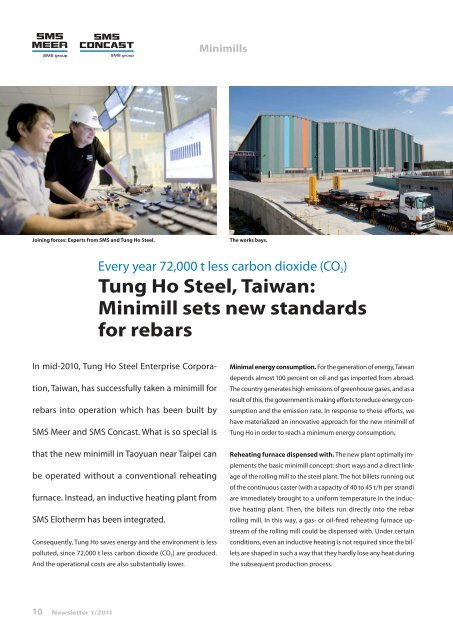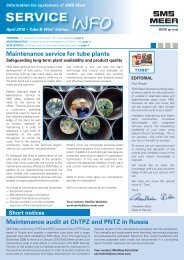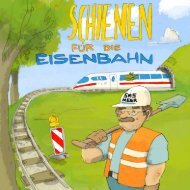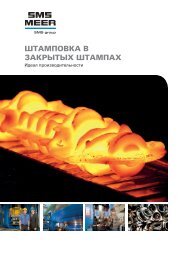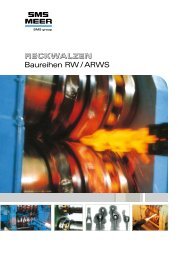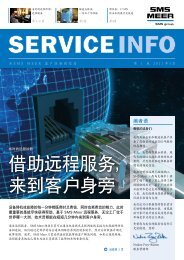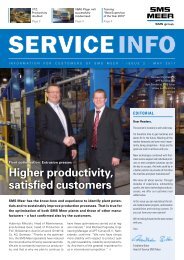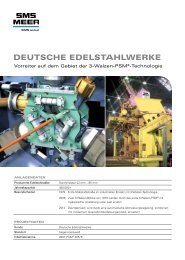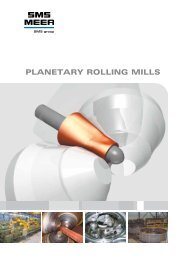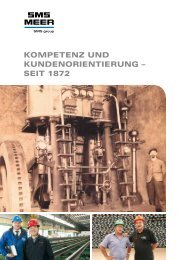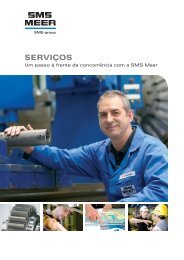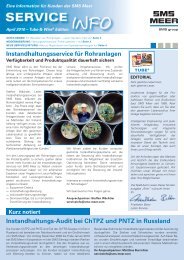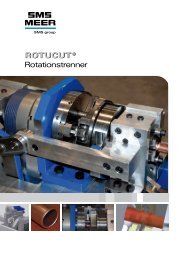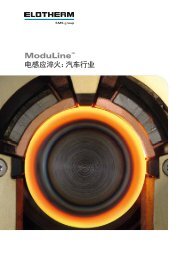LONG PRODUCTS BULLETIN - SMS Meer GmbH
LONG PRODUCTS BULLETIN - SMS Meer GmbH
LONG PRODUCTS BULLETIN - SMS Meer GmbH
Create successful ePaper yourself
Turn your PDF publications into a flip-book with our unique Google optimized e-Paper software.
Joining forces: Experts from <strong>SMS</strong> and Tung Ho Steel.<br />
10 Newsletter 1/2011<br />
Minimills<br />
Every year 72,000 t less carbon dioxide (CO 2)<br />
Tung Ho Steel, Taiwan:<br />
Minimill sets new standards<br />
for rebars<br />
In mid-2010, Tung Ho Steel Enterprise Corpora-<br />
tion, Taiwan, has successfully taken a minimill for<br />
rebars into operation which has been built by<br />
<strong>SMS</strong> <strong>Meer</strong> and <strong>SMS</strong> Concast. What is so special is<br />
that the new minimill in Taoyuan near Taipei can<br />
be operated without a conventional reheating<br />
furnace. Instead, an inductive heating plant from<br />
<strong>SMS</strong> Elotherm has been integrated.<br />
Consequently, Tung Ho saves energy and the environment is less<br />
polluted, since 72,000 t less carbon dioxide (CO2) are produced.<br />
And the operational costs are also substantially lower.<br />
The works bays.<br />
Minimal energy consumption. For the generation of energy, Taiwan<br />
depends almost 100 percent on oil and gas imported from abroad.<br />
The country generates high emissions of greenhouse gases, and as a<br />
result of this, the government is making efforts to reduce energy consumption<br />
and the emission rate. In response to these efforts, we<br />
have materialized an innovative approach for the new minimill of<br />
Tung Ho in order to reach a minimum energy consumption.<br />
Reheating furnace dispensed with. The new plant optimally implements<br />
the basic minimill concept: short ways and a direct linkage<br />
of the rolling mill to the steel plant. The hot billets running out<br />
of the continuous caster (with a capacity of 40 to 45 t/h per strand)<br />
are immediately brought to a uniform temperature in the inductive<br />
heating plant. Then, the billets run directly into the rebar<br />
rolling mill. In this way, a gas- or oil-fired reheating furnace upstream<br />
of the rolling mill could be dispensed with. Under certain<br />
conditions, even an inductive heating is not required since the billets<br />
are shaped in such a way that they hardly lose any heat during<br />
the subsequent production process.


